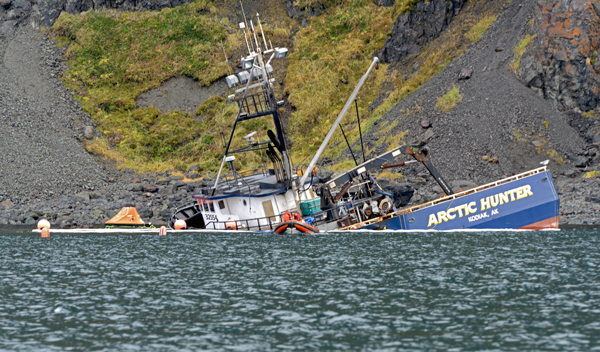[B]Five days later, grounded crabber F/V Arctic Hunter still intact off Unalaska waiting for salvage [/B]
SEAFOOD.COM NEWS [KUCB] by Annie Ropeik - November
The fishing vessel Arctic Hunter is still on the rocks outside Morris Cove, five days after it first ran aground.
Coast Guard public affairs officer Shawn Eggert says a helicopter conducted another flyover of the boat this morning.
“It is awash,” he says. "It’s basically partially underwater, but it did not break up and it hasn’t sunken."
There’s also no sign of an oil sheen. Salvage crews haven’t been able to pump any fuel off the crab boat since Sunday because of bad weather, which is expected to continue through Thursday.
Eggert says it’s not clear exactly how much fuel the salvagers will have to remove when they make it back to the Arctic Hunter.
“They took 9,000 gallons of diesel-water mix off over the weekend. They believe they have 2,500 to 2,800 gallons left,” he says. "But they still have to figure out how much of that is actually fuel and how much is water."
Eggert says that assessment will be done by tomorrow.
As for the investigation into what caused the grounding, that’s essentially on hold until the Arctic Hunter is recovered from the rocks.
“They want to make sure that they can get the vessel out of there first. They’ll proceed with the investigation, but at this time I couldn’t even speculate as to what sort of charges might be brought up,” Eggert says.
The Coast Guard alleges that the skipper was asleep at the wheel when the boat first ran aground early Friday morning. The man failed a breathalyzer exam in the field, but police have said the skipper – and his crew – claim he didn’t have a drink until after the accident took place.
The 93-foot Arctic Hunter is based out of Kodiak.
-
-
- Updated - - -
-
That’s what I like to do after I run aground…Let’s have a drink! Ration of grog for the crew.
